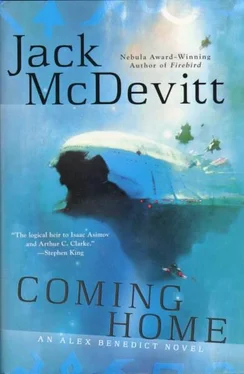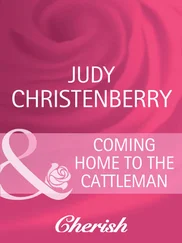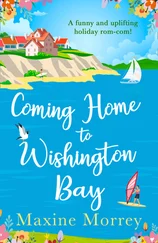“There’s going to be a memorial for JoAnn and Nick at the headquarters building. Middle of the week. They’ll tell us when they lock in the night.”
* * *
That evening, President Davis spoke. He stood behind a lectern, the blue and white colors of the Confederacy draped across the wall behind him. “Friends and citizens,” he said, “you already know of the losses we incurred during an effort to find a better way to manage the rescue of those trapped on the Capella . JoAnn Suttner and Nicholas Kraus, members of the Sanusar Recovery Force working under the auspices of the Department of Transportation, lost their lives in the attempt. I am sorry to report also that, as a result of the experiment, we know now that the technique under development cannot be relied on. We will not risk the lives of the people on the Capella . Therefore, we will be falling back on the lifeboats that we have been preparing for the last few months.
“It is a method we would have preferred not to use because it is more time-consuming than we wish. But it is our safest way to proceed. Consequently, we now face the reality that we cannot take everyone off prior to experiencing another jump. In fact, we will be able to provide an immediate escape for only about two hundred of those on board.
“Having said that, I want to remind everyone that our first consideration remains the safe return of our friends and family members, not on rushing to get them off quickly. Our primary concern is their safety. I regret this reality. But we are confronted with a force of nature. We have no reasonable choice except to wait. It is a price we must be willing to pay to bring this unhappy state of affairs to a successful conclusion.”
* * *
Three nights later, we went downtown to the Riverside Hotel for the memorial service, which had been originally scheduled for the Department of Transportation Building. But the planners had been surprised by the public response to the event. “I don’t think we realized,” Senator Caipha Delmar told us, “that people would turn out the way they have.” Obviously, the sacrifice JoAnn and Nick made had an impact.
Several thousand persons jammed into the hotel. About half got into the Starlight Room, where the ceremony was to be held. The rest filled the lobby, the restaurant, the bar, and a second showroom where the event was put on-screen. John came out onto a raised platform precisely on time, thanked the audience for their support, and introduced himself as Nick’s brother and as the director of the operation that had taken the two lives. “At first,” he said, “I’d planned to describe this simply as an effort gone wrong. But it served to show us that the potential downside of trying to stop the process is too high, and in that sense, because of JoAnn and Nick, twenty-six hundred people will not be put at risk. I’m proud to be Nick’s brother and to have been JoAnn’s colleague.”
That drew somber applause. “Whatever it takes,” he continued, “we will not waste the sacrifice these two heroes have made. We will get those people off the Capella . The lifeboats are ready to go. We’ll take advantage of its return to get the lifeboats to it, to get them on board, and when it comes back in five years we’ll get the passengers and crew off, all of them, and we’ll throw the biggest party Rimway has ever seen.”
The place exploded.
He waited until things calmed down and invited Shara onstage to say something.
She took her place behind the lectern. “I’ll never forget JoAnn,” she said. “She was young and brilliant, and had so much to give, and in the end, she gave it all. And Nick. He’d been a peerless friend. And he was a professional interstellar captain whose first concern was his passengers and crew. If he were here tonight, he’d consider that the ultimate compliment.”
Prize-winning physicist Akala Gruder said that she had known JoAnn and could not believe she was gone. “In a sense, she never will be.” She had never met Nick, she said. And added, “My loss.”
A few others expressed similar sentiments. Then we got a surprise. John introduced President Davis. He came in through a side door and, like everyone else that night, he spoke without notes. “We are gathered here this evening,” he said, “to pay tribute to our friends JoAnn Suttner and Nick Kraus. I don’t know that I can add anything that hasn’t already been said. Other than that it gives me great hope for the future to know that these two friends were by no means unique. Where, I wonder, do we get such men and women?
“One more thing. The parents of both are present with us tonight. They were invited to speak this evening, but they declined. We can all understand that. The emotional pressure is high. And I think their natural inclination is to let others do the talking. But that said, I would now like to invite them to come up to receive the Presidential Medal of Honor, which is hereby granted to JoAnn Suttner, and to Nicholas Kraus, for extraordinary heroism in the cause of providing assistance to those in desperate need.”
JoAnn’s husband, Jerry, was halfway across the Confederacy and had not been able to attend. But both sets of parents, Laura and Joseph Dayson, and Sandra and Jack Kraus, made their way onto the platform. The President handed them the awards, they exchanged a few comments, everybody wiped their eyes, and it was over.
* * *
In the morning, I was just settling behind my desk when Jacob announced that I had a call from Nick’s mother. “I saw you at the memorial last night, Chase,” she said. “I tried to get to you, but we lost you in the crowd.” That brought an uneasy moment.
“Hello, Ms. Kraus. It’s nice to hear from you. Please accept my condolences on Nick’s loss.” I paused, not sure where the call was going. “What can I do for you?”
“Call me Sandy, please. I know Shara, and she told me how things went.” My heart picked up a beat. “I wanted to say that I’m glad you and she were there. And that I hope you’re not too upset.”
“I’m okay,” I said. Suddenly I was back in the passenger cabin with Nick while he asked whether he could take me to Cranston’s. “I wish I could have helped.”
“You were there. It’s all you could do. Jack and I just wanted to say thanks. And to make sure you’re okay.” Jack, of course, was Nick’s father.
“Yes. Thank you. I’m all right. How about you?”
“We’ll get through it, Chase.” Her voice caught. She said good-bye, and she was gone.
History fades into fable; fact becomes clouded with doubt and controversy; the inscription molders from the tablet; the statue falls from the pedestal. Columns, arches, pyramids, what are they but heaps of sand; and their epitaphs, but characters written in the dust?
—Washington Irving,
The Sketch-Book, 1820 C.E.
Alex showed up next day on Morning Deadline , whose host was Cal Whitaker. The topic, of course, was the Capella . Its projected arrival was now two weeks away. Also appearing on the program was Levi Edward, a celebrated newscaster who’d retired twenty years earlier and was now visibly near the end of his life. His face was lined, and he grunted with pain every time he moved. “Too much running for interviews,” he said, trying to turn it into a joke. The familiar baritone was still there.
Everyone in the audience knew that Edward’s wife, Lana, was on the lost cruise ship. He’d been at the forefront in pushing for a way to bring the Capella home. “I’d love to see her again.” He looked across the glass table at Alex. “If she has to wait another five years to get back—” He delivered a forced smile.
Читать дальше












